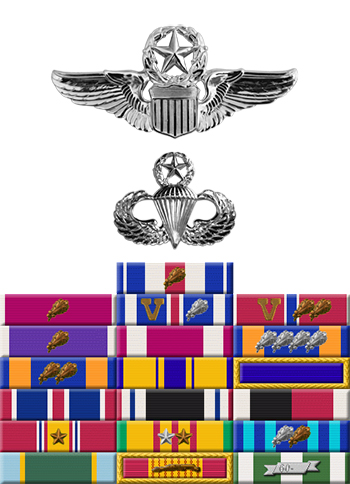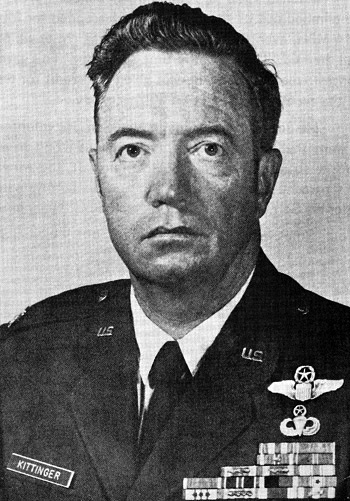
|
Joseph W. "Joe" Kittinger, Jr. |
 |
|||
| Rank, Service | ||||
Colonel O-6, U.S. Air Force |
||||
| Veteran of: | ||||
|
||||
| Tribute: | ||||
Joe Kittinger was born on July 27, 1928, in Tampa, Florida. He entered the Aviation Cadet Program on March 24, 1949, and was awarded his pilot wings and commission in the U.S. Air Force on March 29, 1950. His first assignment was to West Germany, where he flew fighters from July 1950 to July 1953. He was then assigned to the Air Force Missile Development Center at Holloman AFB, New Mexico, where he flew experimental jet fighters and participated in aerospace medical research. He flew zero gravity experiments and also flew the air tracking mission for Dr. John Stapp's famous rocket sled run. He was assigned as a test pilot for Project Man High, which was created to study cosmic radiation, astronaut selection and training, physiological monitoring, and high altitude hardware. In 1957, Kittinger piloted the balloon Man High One to an altitude of 96,000 feet. Information gained from these experiments were used in Project Mercury. From 1958 to 1960, Captain Kittinger participated in Project Excelsior, with the goal to put a man in space and to test a person's ability to survive high altitude bailouts. He made a parachute jump from Excelsior I from 76,000 feet in 1959, and from 102,800 feet in Excelsior III on August 16, 1960. On this final jump, Kittinger set three world records that stood for 52 years until being broken by Felix Baumgartner on October 14, 2012; highest balloon ascent, longest parachute freefall, and fastest speed by a human through the atmosphere without an aircraft. In October 1960, Kittinger was awarded the Harmon Trophy for outstanding accomplishments in aeronautics. He made his final high-altitude balloon flight during Project Stargazer in 1962. From September 1963 to March 1964, Kittinger flew combat missions in Southeast Asia in the A-26 Invader. He went to Vietnam for a second tour flying A-26's from June 1966 to January 1967. After serving in West Germany from July 1967 to August 1970, Kittinger served a third tour in Vietnam starting in May 1971. He first served as Air Operations Officer for the 432nd Tactical Reconnaissance Wing at Udorn RTAFB, Thailand, and then as Commander of the 555th Tactical Fighter Squadron, also at Udorn. Col Kittinger was credited with shooting down 1 Mig-21 while flying an F-4D Phantom II on March 1, 1972. He was shot down and taken as a Prisoner of War by the North Vietnamese on May 11, 1972. After spending 321 days in captivity, Col Kittinger was released during Operation Homecoming on March 28, 1973. He next went through Air War College before serving as a Vice Wing Commander in Europe. Col Kittinger's final assignment was as Chief of the Ready Team Program Management with Headquarters 12th Air Force at Bergstrom AFB, Texas, from April 11, 1977, until his retirement from the Air Force on July 31, 1978. After his retirement, Joe spent many years flying balloons and acrobatic airplanes. In September 1984, he became the first person to fly solo across the Atlantic Ocean in a helium balloon. He was enshrined in the National Aviation Hall of Fame in 1997. Col Kittinger wears Command Pilot Wings and the Master Parachutist Badge. He accumulated 7,679 flying hours in the Air Force, including 948 combat flying hours in 425 combat missions during three tours during the Vietnam War. In addition, he has flown over 9,100 hours in various civilian aircraft. Joe Kittinger Flew West on December 9, 2022, and was buried at Arlington National Cemetery. |
||||
|
||||

